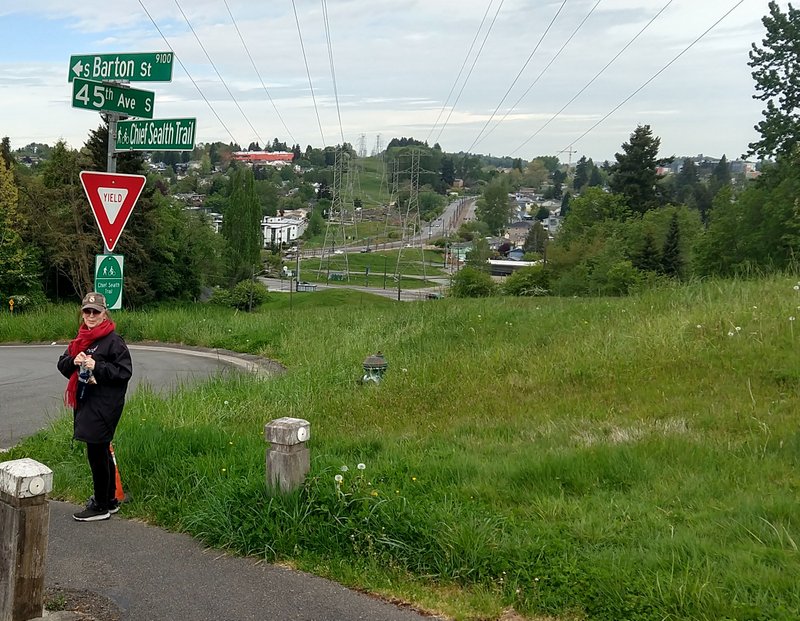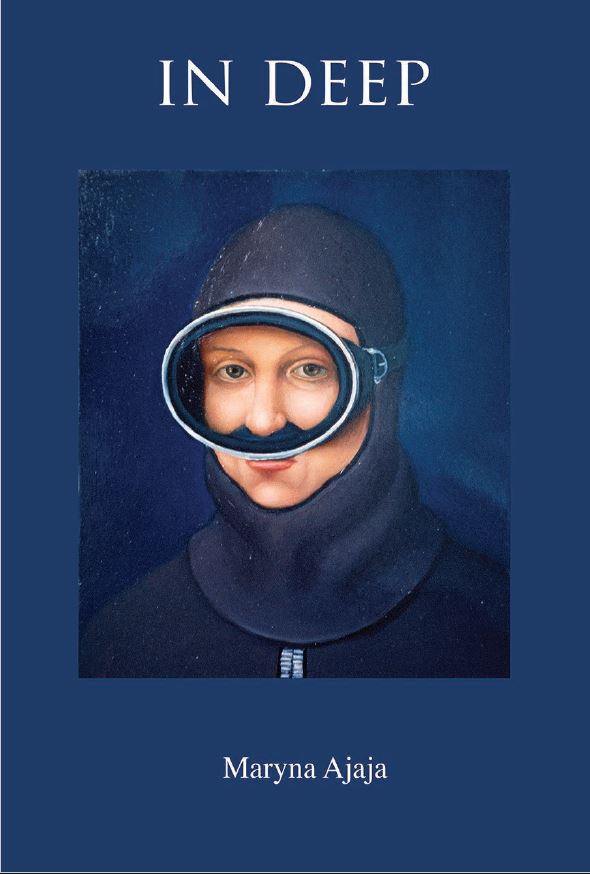Maryna Ajaja has been a senior programmer for SIFF (Seattle International Film Festival) since 1997. SIFF is a twenty-five day film festival of over 400 films, that includes features, documentaries, archival films, animation, experimental, short films, and film forums. Maryna is a writer and a poet and specializes in films from Eastern/Central European, Russia, Baltics, Central asia, and Caucuses. Born in Hollywood, she makes her home in Seattle, Washington since 1969. To order Maryna's latest book of poetry, In Deep, please send her an email at valatmeans@seanet.com
She was interviewed for "Stories OFF the Wall: Quarantine Writings and Interviews" by Otilia Baraboi.
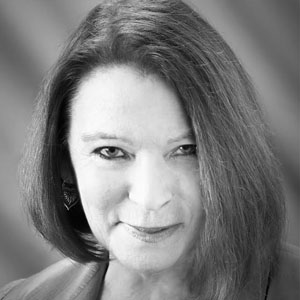
O.B. Can you tell us a bit about your daily routine during these times? What is the best part of your day?
M.A: After SIFF was cancelled, my COVID days of quarantine started by vigorously reading books that have been sitting in my bookshelves that I had not read. I read a book that my mother owned, Essays on Dostoevsky, Amos Oz’s auto biography, Shlomo Sand’s book The Invention of the Jewish People, and Aria, a book of poems by Sharon Olds. For the first time, I explored Netflix. I never have time to view on Netfix because programming films for SIFF keeps me more current than what Netflix offers. On their site, I found the Hungarian film, ON BODY AND SOUL by Ildikó Enyedi – the winner of Berlinale 2017 and a film I love, and the series, UNORTHODOX. The best part of these pandemic days are when reading, viewing, connecting to those near and dear though phone or internet, or going outside for walks on the hills of the Chief Sealth Trail, lifts me out of the sadness and horror of our 2020 virus.
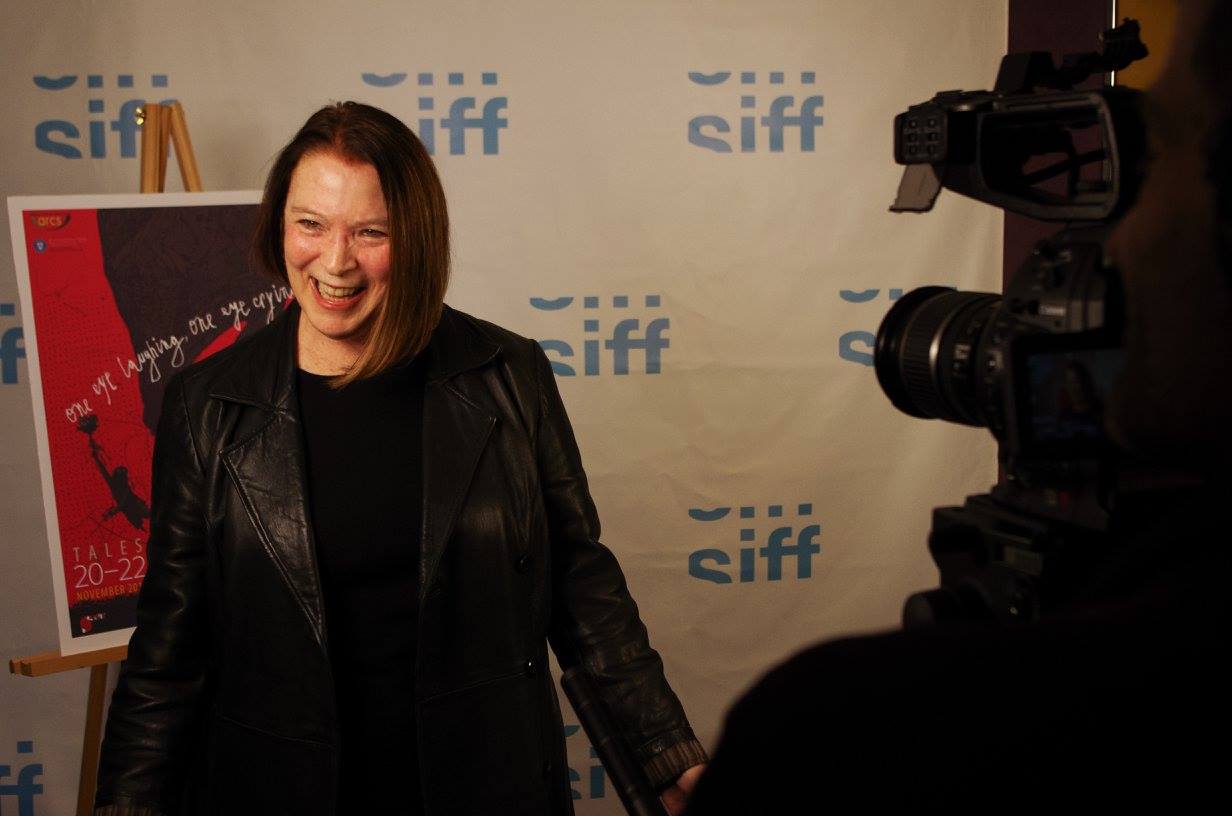
O.B. Do you follow the news? How do you cope with what is happening outside the protective walls of our homes?
M.A: Yes, I follow the news and communicate with people all over the globe who are feeling the effects of COVID 19. Sometimes I turn the news off. Sometimes we listen to music. When music or nature doesn’t help, and I cannot cope, I cry. I know that time will change all this and some will choose to live life differently and others will try to pick up where they left off.
O.B. Name three things that have become “essential” for you and three things (they can be the same) that should become “essential” for the entire world.
During times like these, things get down to basics so I won’t be too philosophical. But I’m thinking about life essential and not so much pandemic essential.
3 essential things for me:
Food and shelter
Connection to people
Wisdom and knowledge
3 essential things for the entire world
Food and shelter
Wisdom and knowledge
Aspire towards pluralism
O.B. How are you making your selection of the virtual events you follow? After all, we only have 24 hours a day and we are now bombarded by many attractive offers online- virtual exhibits, virtual film festivals, virtual poetry, virtual this and that...
M.A: After the cancellation of SIFF, I could not look at films for a while. Reading saved me. In the evenings we view a few good television series like, Homeland, Babylon Berlin. I could view more films on profession platforms like Festival Scope or Cinando, but I’m not ready to spend all my time streaming and give in to the virtual world.
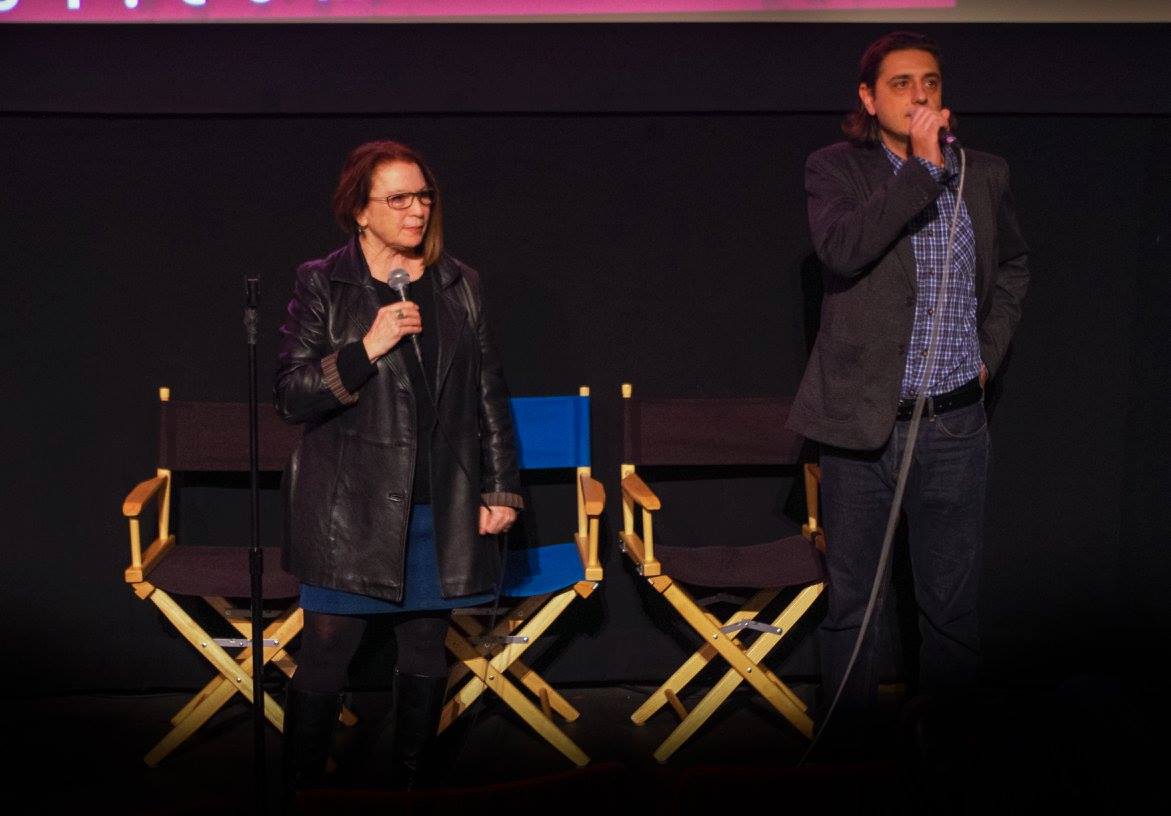
O.B. Let’s talk about your book of poetry – In Deep- that came out in these quarantine times. How did it feel, to „launch” it on Social Media, without a gathering with your readers and friends? Celebrating milestones is a crucial ritual in our society, and for our own sense of closure and development. Have you thought of an alternative event online or will you wait till we can be together again physically for such a gathering?
M.A: First of all, the book isn’t launched yet. The actual book has been in the works for the last few years, but I’ve worked on the manuscript for a long time. The oldest poem, Point No Point is from 1979. When three boxes of books arrived in the midst of the COVID 19 pandemic, it filled the SIFF void. Furthermore, I thought I might have a “captive audience.” Of course it is painful not to be able to gather with people at the present time. An online reading does not really interest me. It would be wonderful to celebrate recovery from COVID 19 with a public reading.
O.B. The title In Deep is visionary. Have you ever felt deep down in your guts that these times will come, or should come, in order to redefine our values and slow down? Slow down for poetry, family, friends, nature, art, our mental and physical health.
M.A. No, I don’t think in those terms. Think of history and the continual wars and plague and other deadly pandemics. Is COVID 19 worse? Art has eased fears for eons and it may not even require us to slow down. Mental health and redefining values is a life long struggle and we need to allow for healing and gaining strength. I try to pace myself to keep empathetic.
O.B. Just like your title suggests it, and the art on the book cover - “Diver” by Marion Peck- , the urge for speed vanishes underwater. We open our eyes to observe, make sense of our blurry surroundings. Tell us a bit about one life episode, among the many included in your book, that has acquired clarity thanks to your poetry.
M.A. To me my title In Deep means complete involvement, all red and white corpuscles tuned to attention, the kind of attention that does slow time down to where we cannot even notice its passage. Of all the poems I wrote, CHILDREN was the one that startled me the most and showed me what I really hold dear.
O.B. Your writing is powerful, it hits you with concise performative images such as this one:
“Grief is a short word for a long phenomenon
And is made from pure magma.
Walls cannot stop it.”
Will poetry, literature and arts in general, have the power of “pure magma” to melt down the walls separating nations and cultures? It has become clear that we need more conceptual fluidity to redefine ourselves in relation to others. How do we turn this momentum into a formative experience?
M.A. It already has. Art has the power of a volcano or earthquake and has the force to melt doors and walls. It may leave burns and change the human landscape but people are resilient and have to bend with the changes.
O.B. You have been a long-term friend of the Romanian Film Festival, I remember dearly the first time we met at SIFF Film Center in 2013. Seven years later, the film festival has become an event that reunites around 2000 viewers of various cultural backgrounds. Do you have a special message for our community in these times of great uncertainty for all our programs?
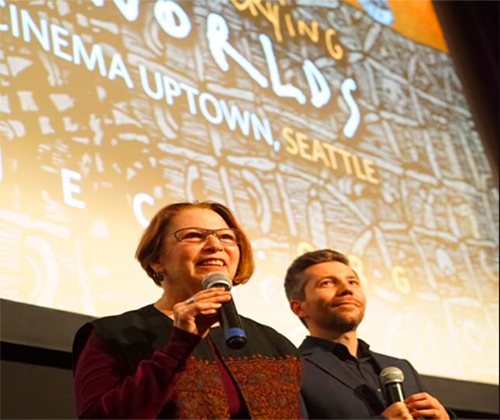
M.A. First, I love to collaborate and if I collaborate with smart people who are equally enthusiastic, it’s an even better. In those kinds of conditions, people learn from each other. And I am convinced that film from Eastern Europe, Central Europe, all the Ex. CIS countries have a lot to offer in regards to digging deep into the human condition. If I had any special message to our film community it would be this: love well, consider others, and allow time and healing processes to create something worth looking forward to.
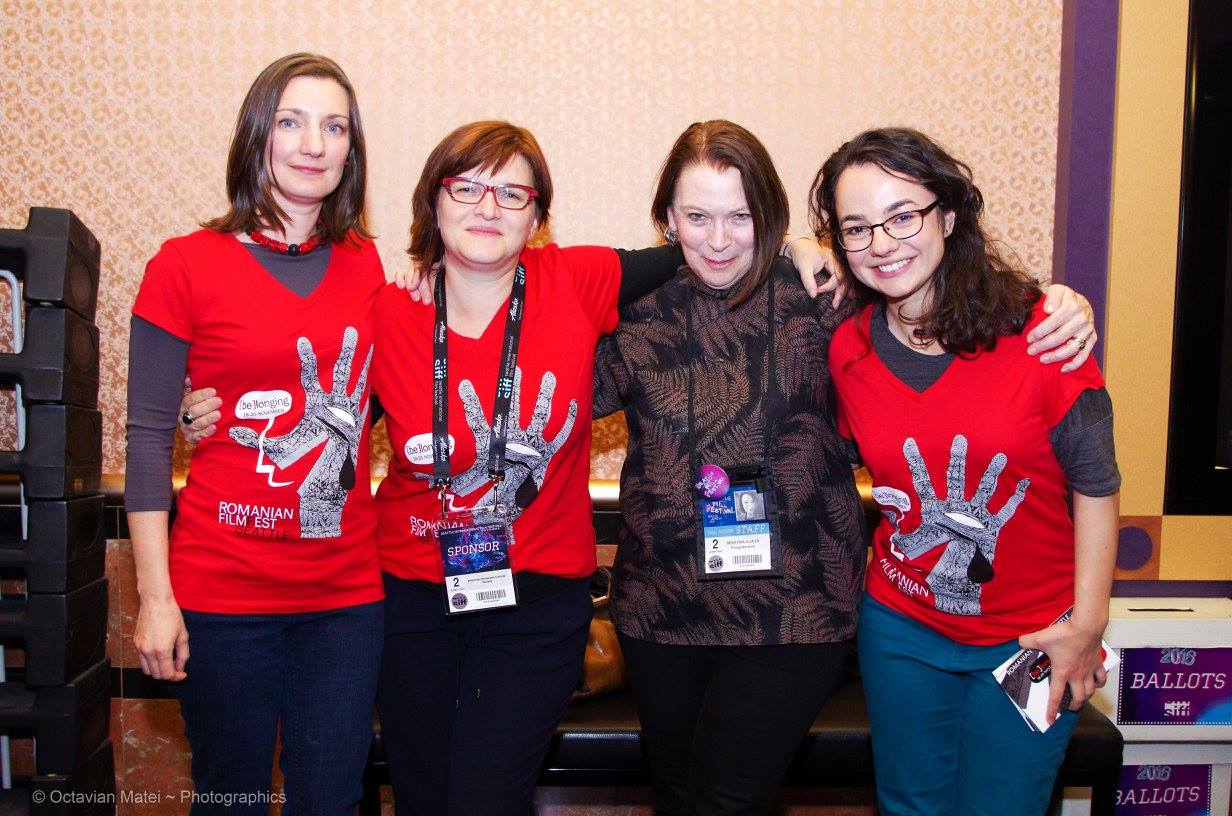
THANK YOU, Maryna Ajaja for this interview! We're looking forward to working together and bringing more Romanian and Eastern European films to Seattle.
Pictures:
1. Maryna Ajaja on her neighborhood walk on Chief Sealth Trail, holding a bag of peanuts for the crows
2. Maryna Ajaja at the 2nd edition of the Romanian Film Festival in 2015, at SIFF Cinema Uptown
3. At SIFF Cinema Uptown, at the Q & A session following the US Premiere of Aferim! (dir Radu Jude), with screen writer Florin Lăzărescu (2015, 2nd edition of the Romanian Film Festival)
4. At SIFF Cinema Uptown, at the Q & A session following "One Step behind the Seraphim", with filmmaker Daniel Sandu (2018, 5th edition of the Romanian Film Festival)
5. With volunteers from the Romanian Film Festival, following Adrian Sitaru's "Illegitimate" at the Seattle International Film Festival in 2016.
